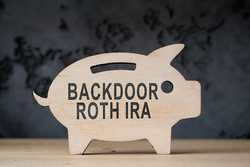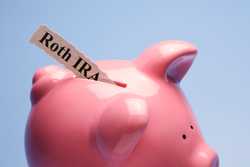Everything You Need to Know About Tax-Efficient Investing

Our evaluations and opinions are not influenced by our advertising relationships, but we may earn a commission from our partners’ links. This content is created by TIME Stamped, under TIME’s direction and produced in accordance with TIME’s editorial guidelines and overseen by TIME’s editorial staff. Learn more about it.
Tax-efficient investing is strategically placing your money in accounts and investments to keep more of your money by reducing taxes. Most investors are familiar with the tax advantages of retirement accounts, but there’s so much more to consider. In this article, we’ll cover:
“It really comes down to maximizing your net worth,” says Logan Allec, CPA and founder of tax relief company Choice Tax Relief. “Ultimately, tax-efficient investing is important because it will result in you having more money—after taxes, of course—than if you ignored the tax implications of your investments.”
To understand how to employ tax-efficient strategies, it’s first helpful to understand how investments are taxed.
“Most investments are taxed in two separate ways,” says Allec. “First, on the cash flow generated by the investment, and second, from the sale of the investment itself.”
“For example, if you own shares of stock in a company that pays dividends, you'll pay tax on the dividends you receive—the cash flow generated by the investment. Then, if you sell the stock, you'll pay capital gains tax on the difference between what you paid for the stock and what you sold the stock for [if the stock is worth more when you sell it].”
Investing with tax efficiency in mind takes a little advance planning. Some strategies are straightforward, such as opening a tax-advantaged retirement account. Others take a little more leg work to understand.
We’ll cover the following strategies:
Many types of investments have built-in tax advantages. Here are a few examples:
Municipal bonds aren’t subject to federal income tax. Muni bonds and muni bond funds may also be exempt from state or local taxes if you live in the state, city or locality where the bond was issued.
Treasury securities—such as Treasury Bills, Treasury Bonds, and Treasury Notes—incur federal taxes but are exempt from state and local taxes.
Some funds are designed to cost as little in taxes as possible. They employ strategies mentioned in this article, such as holding stock for more than a year, practicing tax-loss harvesting (offsetting gains with losses), and not investing in ordinary dividend-paying stocks.
Qualified dividends are taxed as capital gains, while ordinary dividends are taxed as ordinary income. Investments held for more than a year are subject to the long-term capital gains tax rate, which in general is more favorable for most investors than income tax rates.
I bonds, which are issued by the U.S. government, aren’t subject to state or local income tax, but they are subject to federal tax.
Since index funds aren’t actively managed mutual funds, they may not generate as much in capital gains (with some exceptions). This can make them more tax efficient.
Like index funds, exchange-traded funds (ETFs) are passively managed, which makes them more tax efficient than actively managed mutual funds. Also, ETFs are structured in a way that doesn’t generate capital gains taxes when securities are bought and sold. Investors do pay capital gains tax when they sell shares.
Here are the most common accounts that can mitigate your tax burden:
Where you choose to invest can also help minimize taxes. This is what is known as asset location. “At a basic level, you should consider putting assets that are otherwise likely to result in a big tax bill down the line in retirement accounts assets that aren't likely to generate such a big tax bite in non-tax-advantaged accounts, ” explains Allec.
“For example, growth stocks that have the potential to increase in value significantly over the years may make sense to purchase through a Roth or traditional IRA, while an asset like a municipal bond—whose cash flow is tax-free, at least for federal income tax purposes—would make more sense in a non-tax-advantaged account.”
Taxable accounts may be best for:
Tax-advantaged accounts may be best for:
Tax-loss harvesting is selling investments at a loss to help offset any taxable gains from investments that generated a profit. You can deduct up to $3,000 in losses in a tax year. If losses were more than $3,000, they can be carried forward to the next tax year or years.
Holding investments for more than a year means the investment will be taxed as a long-term capital gain when you make a profit from selling it. The long-term capital gains tax rate ranges between 0% and 20% and depends on your income for the relevant tax year. Only very high earners pay 20%. This means most taxpayers will pay less than what they would if gains were taxed as ordinary income. In 2024, for example, single filers with an annual income of $47,025 or less, won’t pay any long-term capital gains tax and need an income of $518,900 to owe 20%.
You may be able to mitigate capital gains taxes by donating stock to charity. If you itemize deductions, you may be able to deduct the full, fair market value of the stock.
If you already have a brokerage account you can start taking steps immediately. If not, you’ll need to open new accounts. Online brokerages can help you get started.
There are also financial technology companies that offer services to maximize your tax-efficient investing strategies. Playbook, for example, is designed to give you a financial plan that uses tax-efficiency planning for your investments.
If you aren’t comfortable with your ability to invest in a tax-efficient manner on your own, consider consulting a tax professional or financial advisor.
Choosing the right investment strategy can go a long way in your tax burden. It’s worth re-evaluating your accounts, investments, and where you’re locating assets. A few tweaks could vastly improve how much money you owe the IRS and how much you’re able to keep.
Contributions to a traditional 401(k) reduce your taxable taxable income in the year in which they are made. The money grows tax free and you pay income tax on withdrawals in retirement.
In 2024, the contribution limit to a 401(k) is $23,000—rising to $23,500 in 2025. If you are 50 or older you can make an additional catch up contribution of $7,500 in 2024 and 2025. And, beginning in 2025, if you are 60, 61, 62, or 63 your catch-up contribution limit goes up to $11,250—but only if your employer chooses to add this feature to your plan.
There is no one-size-fits-all tax-efficient investment or strategy. There are a variety of investments, accounts, and strategies that can reduce your tax burden. If you need help choosing, consider consulting a financial advisor or financial planner with tax expertise before making an investment solely for tax efficiency.
The information presented here is created by TIME Stamped and overseen by TIME editorial staff. To learn more, see our About Us page.




